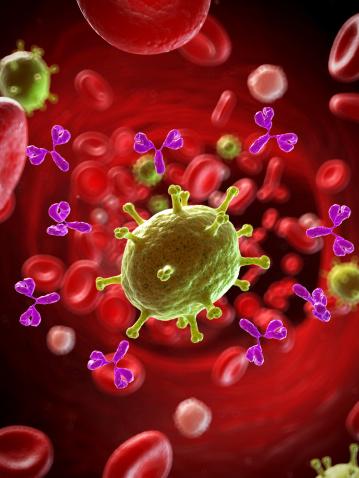Amid a surge of MERS-CoV (Middle East respiratory syndrome coronavirus) cases, two research teams today—one based at Harvard University and the other in China—said they have identified antibodies against the novel virus, the first of many steps toward developing a treatment against the disease.
The two teams used different search strategies and identified different types of antibodies, but their target was the same: preventing the spike-shaped protein on the surface of MERS-CoV from binding to receptors on the surface of cells that line human airways.
MERS-CoV causes a respiratory infection that can lead to severe pneumonia and kidney failure. The disease is fatal for more than 40% of patients infected, and so far there is no treatment or vaccine.
Harvard-led group finds key candidate
The group based at Harvard's Dana-Farber Cancer Institute, along with scientists from the University of North Carolina at Chapel Hill, published their findings today in Proceedings of the National Academy of Sciences. The work was partly funded by the US Defense Advanced Research Projects Agency (DARPA) and the National Institutes of Health (NIH).
They used a library of human antibodies created and maintained by Dana-Farber to look for any that could be used against MERS-CoV. With about 27 billion antibodies, the Dana-Farber collection is one of the largest in the world, according to a press release today from institute.
The virus sample they used to screen for the antibodies was one from a patient whose illness was detected in England. The team used a novel panning strategy to select the antibodies. They found seven MERS-specific neutralizing antibodies, including one labeled 3B11 that they wrote is a lead candidate for further research.
The researchers also performed tests to see how the virus evolves after exposure to the neutralizing antibodies. They found that mutations that allowed the virus to "escape" the antibodies weakened the virus' ability to replicate.
Wayne Marasco, MD, PhD, study coauthor and professor and scientific director at the Center for Human Antibody Therapies at Dana-Farber, said in the press release that the group has produced enough of the antibodies to see if they can protect nonhuman primates and mice against experimental MERS-CoV infection. He added that the lack of good animal models for studying the virus has created delays in proceeding with further research.
He said an antibody prophylaxis or treatment for MERS would be given by injection and last for about 3 weeks. In the study, the authors wrote that the immunotherapy might be especially useful for healthcare workers working at the frontlines of the outbreak. Of more than 400 human MERS-CoV cases so far, nearly 100 have been in health workers.
Chinese team finds powerful duo
In the other study, researchers used a purified, intact receptor-binding domain of the MERS virus to attract antibodies from "single-chain variable region fragments" (scFv) of a nonimmune human antibody library. The collection of antibodies was displayed on the surface of Saccharomyces cerevisiae yeast, provided by Pacific Northwest National Laboratory.
The team published its findings today in Science Translational Medicine. The study was partly funded by China's health ministry and the NIH's National Institute for Allergy and Infectious Diseases (NIAID). To select the antibodies, the team conducted two rounds of magnetic-bead-activated cell sorting, followed by two rounds of florescence-activated cell sorting.
They found two monoclonal antibodies (mAbs), labeled MERS-4 and MERS-27, that had strong neutralizing activity against MERS-CoV. The virus sample they used was provided by Erasmus University Medical Center in the Netherlands. The authors found a synergistic effect when they were used together against pseudotyped MERS-CoV, suggesting that they could be combined for use in future animal and clinical tests.
"The combined effect of the two mAbs would be expected to provide stronger and broader neutralizing activity against wild-type or mutant MERS-CoVs should mutations occur during viral infection and transmission," the team wrote.
Tang XC, Agnihothram SS, Jiao Y, et al. Identification of human neutralizing antibodies against MERS-CoV and their role in virus adaptive evolution. Proc Natl Acad Sci 2014 Apr 28 [Abstract]
Jiang L, Wang N, Zuo T, et al. Potent neutralization of MERS-CoV by human neutralizing monoclonal antibodies to the viral spike glycoprotein. Sci Transl Med 2014 Apr 28 [Abstract]
See also:
Apr 28 Dana-Farber press release





















